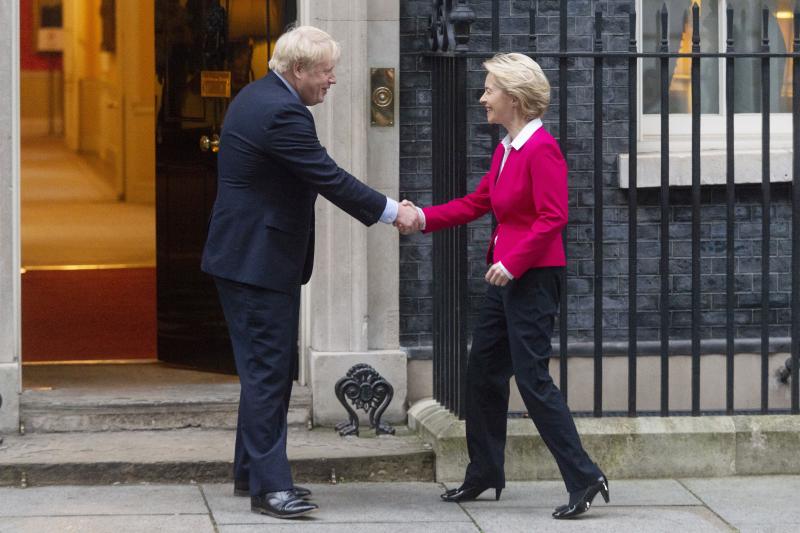Alarmist talk raises doubts about a post-Brexit British revival
- By Robert Griffiths
 0 Comment(s)
0 Comment(s) Print
Print E-mail China.org.cn, January 23, 2020
E-mail China.org.cn, January 23, 2020

The Conservative Party's thumping victory in last December's General Election has resolved Britain's long-running political crisis to some degree, at least temporarily.
With an overall majority of 80 seats in the House of Commons, Boris Johnson's government is well placed to push through an ambitious legislative program over the next year or two. There may be some opposition and obstruction to its plans in the unelected House of Lords, but this will be largely tokenistic and constitutionally limited.
The administration's plans were set out in the Queen's Speech to the Westminster parliament on December 19. Top of the bill was the fulfillment of Boris Johnson's hustings promise to "Get Brexit Done" by legislating for the U.K. to leave the European Union on January 31. This will be followed by a "transition period" of eleven months, during which Britain will remain in the EU in all but name, abiding by EU laws and rules.
The Prime Minister has also made clear his determination to negotiate a new and comprehensive UK-EU free trade agreement by the end of 2020 or, if that proves impossible, to exit the transition period without one. After any such "No-Deal" Brexit, UK-EU economic relations would be governed by the rules and obligations that apply to all member states of the World Trade Organization and other international bodies.
Should negotiations between the U.K. government and the EU Commission head for the "No Deal" rocks, Johnson will come under intense pressure from Britain's business organizations to make the necessary compromises – or capitulations – to reach a deal.
Already, the Confederation of British Industry and vehicle manufacturers have voiced their concerns about Chancellor of the Exchequer Sajit Javid's comments that the U.K. would no longer be subject to EU "Single Market" rules from the end of 2020.
Johnson had previously insisted his post-Brexit government must be free to rescue failing industries with state aid and favor British business with public sector procurement contracts.
In retaliation, on the eve of talks with Britain's prime minister, President of European Commission Ursula von der Leyen declared that such divergence from EU rules would deny Britain the "highest quality access" to the Single Market.
Moreover, she complained, the British government's intention to regulate immigration from the rest of Europe would breach the "integrity" of the EU and its Single Market. As von der Leyen put it: "Without the free movement of people, you cannot have the free movement of capital, goods and services."

In a subsequent face-to-face discussion on Jan. 8, Johnson told her that a post-Brexit trade deal must accept full British control over U.K. fishing grounds and exclude free movement of people and any EU Court of Justice jurisdiction.
This aggressive approach has alarmed Britain's powerful financial sector centered on the City of London.
Banking corporations have always opposed Brexit, fearing that it might raise barriers to the cross-border movement of capital and, in particular, damage London's lucrative Eurobond market as EU member governments switch bond issues to Frankfurt, Zurich or even New York.
Some more cavalier City outfits have supported Brexit for fear that new EU-based controls might end their own advantage over their more regulated European competitors. Again, the European Commission wants to ensure some form of British alignment with the set standards in return for continued access to its financial markets.
These are not promising signs that a comprehensive free trade and investment agreement can be reached before the end of this year.
It should also be borne in mind that the Conservative Party derives much of its financial and political support from the big corporations, many of which support EU neoliberal rules and want to maintain zero-tariff trade and the free movement of capital. Powerful elements in the state apparatus and the mass media also support the closest possible alignment with EU treaties and institutions.
Johnson, on the other hand, wants to talk tough before the serious negotiations with the EU begin. He hopes to consolidate the support won by his "Get Brexit Done" slogan in some traditional Labor-voting areas at the General Election.
This desire lies behind proposals in the Queen's Speech to invest heavily in the National Health Service, social care for the elderly and education, and to raise the National Living Wage, protect housing tenants, help first-time home buyers and crackdown on violent and anti-social crime in local communities.
But working-class voters should prepare for disappointment.
Johnson's record indicates that, while he is ideologically committed to capitalism and British imperialist interests around the world, he will subordinate tactical and even strategic considerations to his own personal advancement.
He will capitulate to EU and British ruling class demands if confrontation threatens his high office. Likewise, he will dilute or abandon "progressive" manifesto and legislative pledges should they provoke too much big business opposition.
At the same time, we can be sure that he will pursue his promises to create an even more flexible labor market and to undermine the effectiveness of industrial action in the transport sector. Austerity is likely to continue for many millions of low-paid or unemployed workers, pensioners and young people.
Robert Griffiths is a former Senior Lecturer in Political Economy and History at the University of Wales and currently the General Secretary of the Communist Party of Britain.
Opinion articles reflect the views of their authors only, not necessarily those of China.org.cn.
If you would like to contribute, please contact us at opinion@china.org.cn.






Go to Forum >>0 Comment(s)